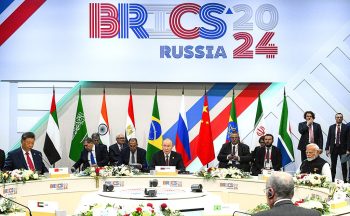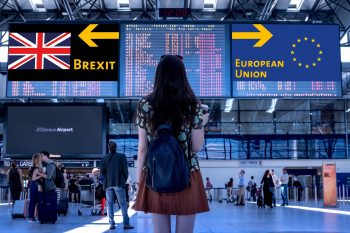GEOPOLITICS: The Eternal Brexit – Analysis By George Friedman
GEOPOLITICS: Eternal Brexit – Analysis
By George Friedman posted on September 10, 2020
via GEOPoliticalMatters.com
In 2016, the British government called for a referendum on whether the United Kingdom should remain a member of the European Union. The British people voted to leave. Since then, there has been a struggle in Britain to reverse the decision and a struggle between Britain and the EU on the terms of the departure. It’s now 2020, and the process still isn’t finished. Given that the EU is based merely on a treaty – not a federation – sovereignty is a matter for individual states, not the “government” in Brussels. Treaties are arrangements between nations,not a merger of nations, and therefore are reversible.
Since we are about to see a new and presumably final round of negotiations on the divorce, with the EU now calling for a rapid resolution, even as the Irish question is now the blocker, the real issue is how this matter has dragged on so long. To anyone who has been divorced or seen one, it makes sense: Divorces are almost always filled with rage, recrimination, desires to inflict
pain and sometimes the desire that the old affection be resurrected. The children are made pawns. Friends must choose sides. The difference, of course, is that Britain’s relationship to the EU is simply a matter of national interest and not the result of a love affair. Britain and the EU lived together when they had to, but they never married. And so the lawyers continue to meet as each side creates more barriers to an amiable disengagement.
The first barrier to the separation was within Britain. The technocratic classes and the financial community took it for granted that Brexit would be rejected by the voters. When it wasn’t, they had two choices: face the fact that they had misunderstood their country, or label the vote flawed and the result of ignorance on the part of those who voted for withdrawal. Naturally they chose the latter, a decision that is primarily responsible for Brexit’s delay. If the ignorant voted for Brexit, all they needed was a little education in the error of their ways, or so the thinking went. The best strategy, then, was to delay Brexit and persuade the country that Brexit would be catastrophic so that the government could reverse the vote.
The problem was that the technocracy and the financial community were confusing their interests with those of the country as a whole. Free trade had benefited many, but it had also left the industrial classes struggling as low-wage countries had access to the British market. The result was a near depression in the industrial heartland of Britain. As in other countries, those who benefited from free trade were either indifferent or mostly ignorant of the price others were paying. They never imagined they would lose the referendum, but then they didn’t know how many unemployed industrial workers there were.
A second barrier concerned national sovereignty, particularly on immigration. The enlightened elite felt a moral obligation to help immigrants. They were in lockstep with the elite of the European continent on this. Of course, the immigrants would not be living with the elites in their neighbourhoods. Immigrants live in low-cost housing, the same kind that the industrial class has lived in since its decline. The idea that immigration could not be blocked under EU rules meant not only a loss of national sovereignty but a burden to be uniquely carried by those who have lost the most.
The irony was that, historically, the political factions that championed the interests of the industrial working class and were hostile to the financial elite found themselves with the opposite stance: The industrial working class was now perceived as reactionary and racist, while the financial and technocratic elite was seen as enlightened. If opposition to Brexit was enlightened, then the vote could be reversed once the rest of the country understood as much. Hence the strategy to reverse the vote and reaffirm British commitment to the EU. This continued until the election of Boris Johnson settled the question.
The EU, meanwhile, did what it could to make Brexit unpalatable with a two-pronged approach. The first was to make it appear that Brexit would be financially catastrophic for Britain and relatively inconsequential to the EU. The second prong was to make the negotiations as difficult as possible, setting terms as onerous as possible and difficult for Britain to accept. The irony was that if Brexit was of so little concern to the EU as it portrayed, then the seemingly inflexible stance it took made no sense. In truth, losing free access to the second-largest economy in Europe was enormously important, and bargaining positions notwithstanding, some accommodation was essential. The driving force in this strategy was an implicit alliance between anti-Brexit Britons and the EU. Both badly wanted to keep Britain in the EU, and the actions of each were meant to help the other.
A rigid negotiating position by Brussels made a manageable Brexit seem impossible, and might strengthen the hand of anti-Brexit British. At the same time, the constant manoeuvrers to reverse Brexit strengthened Brussels’ hand since they were dealing with what might be a declining faction in Britain. Together, these two factions might break the back of Brexit.
The strategy failed, of course, because neither faction could recognize or concern itself with the price the British industrial class was paying. Both expected this class to weaken, but in fact, the faction remained intact and even attracted others. The lower class movements, labelled right wing by the elite, became more powerful and more extreme. The British problem became the European problem, same as it ever was.
We are now entering what seems to be the final phase. Brussels appears to be bitter at how long the process has taken, and the chief EU negotiator, who had been threatening and unrelenting in his negotiating strategy, appears to have been removed from his position. In other words, the EU is no longer the issue. Once Britain had decided to leave, there was nothing the EU could do except delay. The issue now is the historical British issue: Ireland. Ireland is in the EU and will stay. It wants free trade with Northern Ireland. Northern Ireland is part of the U.K. and therefore will leave the EU. The EU cannot permit free trade between an EU member and a part of Britain since that will turn into free trade with England, which is not nearly as much a problem for Ireland or Britain as it is for the EU. The EU is baulking, and Britain is leaving. That may reignite the political conflict in Northern Ireland.
Marriages are wonderful things. Divorces are agonizing things for all involved. This is particularly relevant when the couple has merged as completely as a good marriage requires. The lesson for nations is that all alliances end in divorce. And the more focused and limited, the less agonizing the inevitable is. In a marriage, all are one, or should be. In a political arrangement that is never the case. It’s nothing more than nations pursuing their national interest. Until death do us part does not apply to nation-states.
About George Friedman
George Friedman is a Hungarian-born U.S. geopolitical forecaster, and strategist on international affairs. He is the founder and chairman of GeopoliticalFutures.com an online publication that
analyses and forecasts the course of global events.









